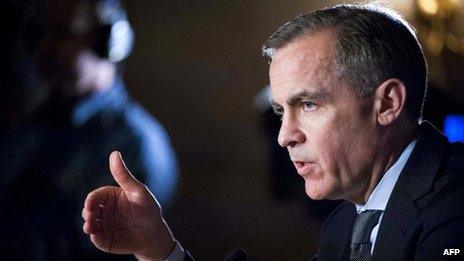UK interest rates remain on hold
- Published

Mr Carney has indicated he does not want interest rates to rise for some time yet
UK interest rates have been kept unchanged at their record low of 0.5% by the Bank of England.
The Bank's Monetary Policy Committee, external (MPC) also left the £375bn quantitative easing stimulus programme unchanged.
Analysts now hope that the Bank will use next week's inflation report to signal changes to its policy of forward guidance.
There had been speculation that the Bank would issue a statement alongside the latest interest rate decision.
However, in announcing the hold in rates and quantitative easing, the MPC said it, "reached its decisions in the context of the monetary policy guidance announced alongside the publication of the August 2013 Inflation Report".
Stronger growth
When the policy of forward guidance was first announced, in August last year, Bank of England governor Mark Carney said the Bank would not raise interest rates until the unemployment rate fell to 7% or below.
At the time the Bank did not predict this rate would be hit until 2016, but recent strong growth in the UK economy has led many economists to revise their forecasts.
Jobless figures released last month showed that the unemployment rate fell to 7.1% in the three months to November.
However, when at he appeared at the World Economic Forum in Davos last month, Mr Carney indicated that he did not want interest rates to rise for some time yet.
There is pressure on Mr Carney to use next week's inflation report to clarify or amend his forward guidance policy in the light of those recent economic figures.
Some say any future decision on interest rates should be linked to factors other than the jobless rate.
David Kern, chief economist at the British Chambers of Commerce, said: "Linking forward guidance exclusively to unemployment has proved counter-productive.
"Focusing instead on a range of key indicators would increase its effectiveness, reinforce business confidence, and pour cold water on the cynicism that many City analysts have demonstrated."
Some of the pressure on the Bank has eased because of the slowdown in inflation. The annual rate fell to 2% in December, the first time it has been at or below the government-set target of 2% since November 2009.
UK interest rates were first cut to their current level in March 2009.
Jonathan Loynes of Capital Economics said: "The MPC's decision to leave policy on hold today was almost certainly the last to be taken under the unemployment-focused forward guidance adopted just six months ago.
"But whatever replaces it, interest rates are likely to remain at very low levels for a long time yet.
"One option is simply to switch the focus to a different variable, such as wages growth or nominal GDP. But the unemployment rate experience has proved the folly of relying on a single indicator to represent the overall state of the economy."